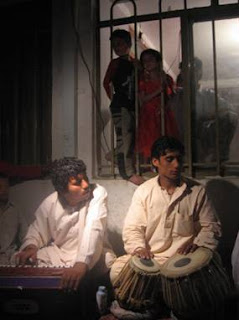The word saz سز is used for blood money or compensation in lieu of killing. Under the custom of saz a person who feels penitent after committing a deliberate murder, approaches the deceased’s family through a Jirga and offers to make payment of blood money to end the enmity between them. All hostilities come to an end between the parties after acceptance of saz. Sometimes the payment of compensation takes the form of giving a girl in marriage to the aggrieved party. It is also called swarah, which binds together the two parties in blood relations and thus helps in eradicating ill will and feeling of enmity.
Friday, April 29, 2011
Hamsaya - neighbor
The word hamsaya همسایه stands for neighbor in Pashto, but it may also be applied to a man who abandons his home either due to poverty or due to blood feud and seeks protection of an elder of another village. In this way the latter becomes his client or vassal, it is therefore incumbent upon the protector to save his hamsaya from insult or injury from any source.
Balandra and Ashar
Balandra (Pashto: blandra بلندره) is a word used by the Afridi tribe to express an invitation Ashar ( عشر) is an Arabic wording meaning tenth and can refer to a religious tithe or tax. Both balandra and ashar can also be used to describe a village aid program under which a particular task is accomplished on the basis of mutual cooperation and assistance. At the time of sowing or harvesting, the villagers lend a helping hand to the man who seeks their help. They help to plough his fields at sowing time and assist him in reaping his crops at the time of harvest. The man thus obliged, by the fellow villagers holds a feast in their honor in the evening.
Itibar - Trust
Itibar إعتبار which means trust, or guaranteed assurance, is the arch of society, which is governed by unwritten laws or convention. All business including contracts relating to sale and mortgage or disposal of the property, is transacted on the basis of trust or itibar. Such transactions are verbal and are entered into in the presence of the village elders or a few witnesses. The violation of itibar is considered a dishonorable act, one unbecoming of a gentleman and contrary to the norms of Pashtunwali.
Cats in Afghan culture
(Pashto: pisho پیشو )
Mountains
Wolf
A lewë لیوه "wolf" is a word used to describe a bad, corrupt person. A wolf is a person that takes things that are supposed to be given to others. Many Afghans describe government ministers as lewan لیوان “wolves”.
Bloody Sword
Blood symbolizes violence, martyrdom, sacrifice, injustice, tyranny, oppression, or victory in battle. In conjunction with a sword evokes both the literal violence inherent in the jihadi struggle and the possibilities of a military victory. The blood on a sword being held by a fighter emphasizes the strength and power of the jihadi fighter and affords him and inflated stature (that of a strong successful warrior). It could also refer to the fight or battle (literally or figuratively), and could connect him to notions of the Islamic past, especially to first generation Muslims, and their success in Jihad. Blood dripping from a sword may have a strong Salafi سلفی connection.
Subscribe to:
Comments (Atom)







